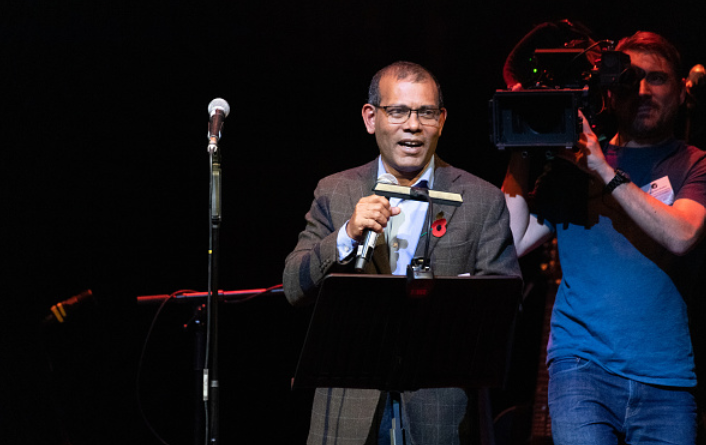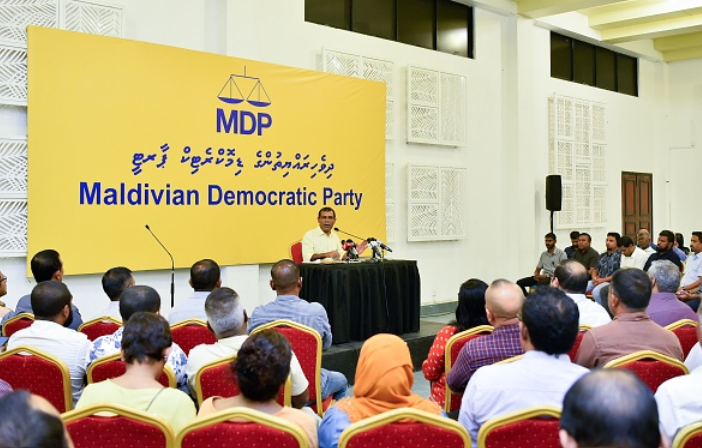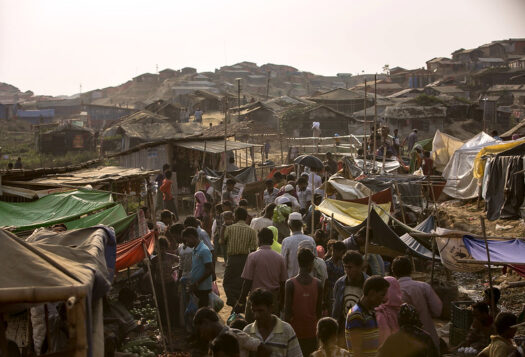
A rapidly unfolding power struggle between two pivotal figures in the Maldivian Democratic Party (MDP) — President Ibrahim Mohamed Solih and former President Mohamed Nasheed, who currently serves as the Speaker of Parliament — threatens to transform the nation’s political scene.
The relationship between the two leaders, cemented by a friendship that dates back to their childhood and deep familial connections — for instance, the first lady is a cousin of Nasheed’s — spans decades. Despite these ties, Nasheed’s aspiration to reclaim executive power has sparked a rift between them, fracturing their friendship and alliance.
A rapidly unfolding power struggle between two pivotal figures in the Maldivian Democratic Party (MDP) — President Ibrahim Mohamed Solih and former President Mohamed Nasheed, who currently serves as the Speaker of Parliament — threatens to transform the nation’s political scene.
In January this year, Nasheed challenged Solih in the MDP presidential primaries but was unsuccessful. Refusing reconciliation, Nasheed alleged election manipulation, claiming that approximately 39,000 of his supporters had been cut from the party registry.
In response to this alleged injustice, Nasheed and his allies, including Deputy Speaker Eva Abdulla, created a new faction within the MDP. Anticipating potential expulsion by the party’s leaders as they openly express their desire to work with the opposition to unseat the president during the upcoming elections in September, this faction has now initiated the formation of a new party, “The Democrats.”
Deputy Speaker Eva Abdulla, herself a prominent former member of MDP, is assisting Nasheed in establishing the new party. Abdulla, along with other Nasheed loyalists, have left the MDP to join The Democrats and are encouraging MDP members loyal to Nasheed to do the same. The party is yet to be officially registered, but is in the process of doing so. It has submitted a list exceeding 3,500 members to the Election Commission, surpassing the 3,000-member requirement to form a recognized party. The Elections Commission is currently reviewing this list.
If approved, with 12 members in parliament, The Democrats will become the main opposition in parliament, entitling them to not only state finances and fielding candidates in elections, but also potentially modifying the composition of important parliamentary committees. Nasheed, while still technically the MDP leader, has not yet officially joined The Democrats. If he does, he would likely become the minority leader, especially with ongoing attempts to remove him from his position of speaker of parliament.
The rift between Nasheed and Solih was formalized in late 2021. Earlier in 2021, Nasheed narrowly survived an assassination attempt linked to Islamic extremists, who targeted him for his socially liberal views. After medical treatment in Germany, he returned to the Maldives and advocated for hate-speech legislation to prevent hostile targeting of those accused of insufficient religiosity, a dangerous charge in the Maldives, where religion and nationalism are deeply entwined.
While initially supportive, the government pulled back after losing the support of the conservative Adhaalath party, which is politically aligned with the Solih administration. Infuriated by the government’s capitulation to political pressure, Nasheed circulated an official statement expressing his unwillingness to continue working with Solih.
However, the tension between Nasheed and Solih has deeper roots, stemming from the former’s ongoing ambition to recapture the reins of executive authority. For years, Nasheed, a charismatic former political prisoner, had been the face of the MDP, leading his party to victory in the 2008 elections and subsequently becoming the Maldives’ first democratically elected President. His term ended prematurely in 2012 amid opposition protests and a controversial forced resignation.
During Yameen Abdul Gayoom’s presidency, Nasheed was convicted on terrorism charges, which barred him from contesting the 2018 presidential elections. Despite being the party’s first choice, Nasheed pragmatically stepped aside to support an alternative candidate, Ibrahim Mohamed Solih, who eventually won the presidency.
After his terrorism conviction was overturned, Nasheed made a triumphant return from exile in 2019. He spearheaded his party’s campaign in the parliamentary elections, securing a supermajority victory, and assumed the role of Speaker. Nasheed, however, nurtures ambitions for a higher office still, specifically that of prime minister — a role that would only be possible should the country transition to a parliamentary system. His ongoing push for a national referendum to effect this transition, most notably during the MDP Congress in 2022, continues to fuel the tension between him and Solih, who is staunchly opposed to such a referendum.

Although Nasheed nominally remains the MDP’s leader, his open alliance with the opposition after a controversial primary cannot endure. The MDP’s Parliamentary Group has filed a no-confidence motion against both Nasheed and Deputy Speaker Abdulla. The latter alleges that simultaneous no-confidence motions against both the speaker and deputy create a parliamentary deadlock since neither of them is able to preside over the legislature’s proceedings, including no-confidence votes. Abdulla claims this was deliberately orchestrated by the government to neutralize the parliament’s oversight functions in the upcoming presidential elections. By contrast, the government claims that there is no deadlock at all, and that this is a cynical misinterpretation of parliamentary procedure to delay the impending votes.
Regardless, the upcoming elections are steeped in uncertainty. Yameen, the candidate for the Progressive Party of Maldives (PPM), is currently imprisoned on money laundering charges. Jumhooree Party (JP) leader Ibrahim Qasim, a former ally of Solih, is running independently as his party’s candidate. Nasheed finds himself in a challenging position, willing to collaborate with opposition parties to unseat Solih, yet marginalized within his own party. Despite his reluctance to leave the MDP, of which he is a founding member, threats to his speakership, and his likely ambition to run in the September presidential elections, could eventually compel Nasheed to officially join The Democrats.
Despite his reluctance to leave the MDP, of which he is a founding member, threats to his speakership, and his likely ambition to run in the September presidential elections, could eventually compel Nasheed to officially join The Democrats.
As the Maldives gears up for these significant elections, the potential impact of The Democrats looms large, promising an unpredictable shift in the political balance.
Also Read: Maldives’ Chagos Conundrum: Continuing Inconsistency and its Politicization
Editor’s Note: A version of this piece was originally published on The Diplomat, and has been republished with permission of the author.
***
Image 1: Roberto Ricciuti/Redferns via Getty Images
Image 2: Ahmed Shurau/AFP via Getty Images


